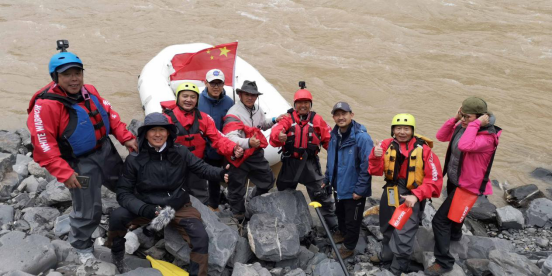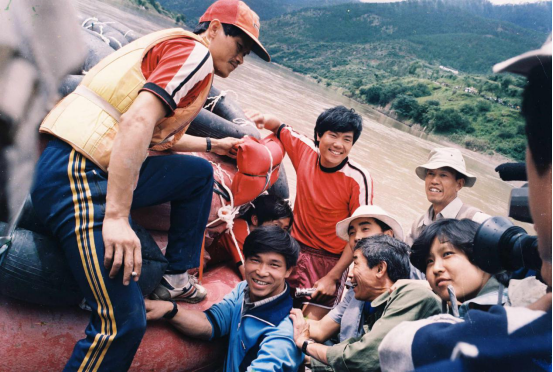Source:2021-04-06
Even as the curtain fell on the 16th Beijing International Sports Film Week in 2020, the thinking behind what films brought to people continued. The Film Week solicited 158 works in total and after two rounds of review, Warm Current won the "Film Most Favored by Media" award.
How did this documentary showing the Yangtze River rafting incident in 1986 gain such high media popularity? What difficulties and stories did the director encounter during the filming? Recently, Xie Jun, director of Warm Current, revealed the secrets to fans.

A still of Warm Current
Retelling the thrilling incident 32 years ago
Rafting on the Yangtze River, like the five consecutive championships of the Chinese women's volleyball team, was a major event boosting national morale in the 1980s.
In 1985, American professional adventurer Ken Warren planned to complete the world's first Yangtze River rafting expedition. The news spread to China and aroused the keen interest of young Chinese rafting enthusiasts. They believed that "it should be Chinese people to complete the first rafting expedition on the Yangtze River of China."
At that time, China had just implemented reform and opening up, and the national morale needed a spark. The next year, a group of relatively unknown people, for the honor of the motherland, faced the test of life and death, and completed the first full-line rafting expedition of the Yangtze River.
During the five-month expedition, due to insufficient equipment and outdated technology, the rafters used raw courage to fight against nature.
Thirty-two years later, Xie Jun decided to retell this thrilling history in the form of a documentary. “Whenever I recite the name of rapids on the Yangtze River map, I was frightened because I knew how dangerous the rapids are,” said Xie. The documentary was filmed from November 2018 to June 11, 2019. The protagonists are the first generation of adventurers of New China. Expressing love for their country, they conquered the obstinate Yangtze River with their lives on the line.

A still from Warm Current
Opened his heart to win the trust of the rafting team
Xie Jun, who produces sports documentaries all year round, recalled that he heard the story of the Yangtze River expedition long ago and had many friends who were into rafting. To shoot a film that puts sports in the center stage, he did not have many subject options. After considering personal interests, knowledge bases and social connections, he finally determined to shoot the Yangtze River expedition.
Before the shooting, Xie spent four to five months studying the subject. He was familiar with the historical data of Yangtze River rafting, and knew each team member's role in the expedition, all the incidents during the adventure, all the places where team members fell into the water, and other details. The former rafters saw Xie’s enthusiasm and determination and trusted him. "The most important thing in a documentary is truthfulness, so the recognition and trust of the interviewee are of great importance."
The team members' trust in Xie also stemmed from the visual angle of this documentary. Xie stated that there are many ways to represent history. Over the past 30 years, memories of many of the things that happened on the Yangtze River became blurred, but Xie believes that the expedition had a distinctive historical imprint that belonged only to the 1980s.
Xie Jun's understanding of the original aspiration of the rafting team made the members open their hearts. They even gave Xie the diaries of the Luoyang team and the China-US team. To what extent was the competition between the two teams? What was the difference in rafting distance between the two teams? There is no record of these in previous data. Xie Jun spent a whole day comparing the diaries and checking the key points on the map, and then worked out that the final gap in distance between the teams was 430 kilometers.
Compared to interviews, it was more difficult to search for video data of the expedition. Neither Sichuan TV Station, nor Luoyang TV Station or Henan TV Station shot any video. The most important video was filmed by Guizhou Audiovisual Publishing House, which was strange as the Yangtze River never passed by there, Xie stated. Preparing to shoot the documentary, Xie hadn’t found the video as the publishing house went bankrupt. He searched for a long time in the CCTV library. Fortunately, a rafting team member transcribed some videos, through whom Xie patched up all the video materials.

Rafting members full of patriotism and enthusiasm
History creators living happily at present
There is a very moving story in the film. The wife of the rafting team member Yao Maoshu was four months pregnant at that time. Before the rafting, Yao tried to persuade his wife to abort. "If I can't come back, how can you remarry with a kid, he asked." The rafting team members all faced the test of their lives, but were still determined to complete the challenge that represented national honor.
"It now appears that some behavior at that time was unreasonable. But this is a true story of that era, and history is not made for reviewing," Xie stressed. So, in the documentary, he did not show family interviews nor the rafters’ current life. Most of them have a new life, new expectations, and live in the moment. "I didn't want to make the film too sensational. I think the quality of a good documentary is reflected in the fine-tuning of these subtle emotions."
Xie Jun said that after watching the film, Wang Yan, a member of the rafting team, cried twice. During the interviews, Xie also wept emotionally when talking with the team members. "This is the first time in my career. As a professional director, I am not easy to be moved by others. Today, patriotism is often promoted through empty words, and everyone complains that film directors are not good tellers of patriotic stories. However, the people in Warm Current are real and vivid. In the face of life and death, they also hesitated, but in the end they chose to stand out."
The final scene of the documentary was fixed for one day in May 2019. The four members who participated in the Yangtze River expedition years ago are in their 60s. Once again, they arrive at the Tiger Leaping Gorge and plan to raft in the upper reaches of the Jinsha River. Today, their equipment and skills are much more advanced than three decades ago. Without the baggage of the past, they begin to enjoy the fun of rafting and cherish the present even more. From the roaring river, they seem to see themselves more than 30 years ago...
(Jie Mingyue)

© Copyright 2020. All rights reserved
Beijing Olympic City Development Association.All rights reserved.Beijing ICP 13521520 No.